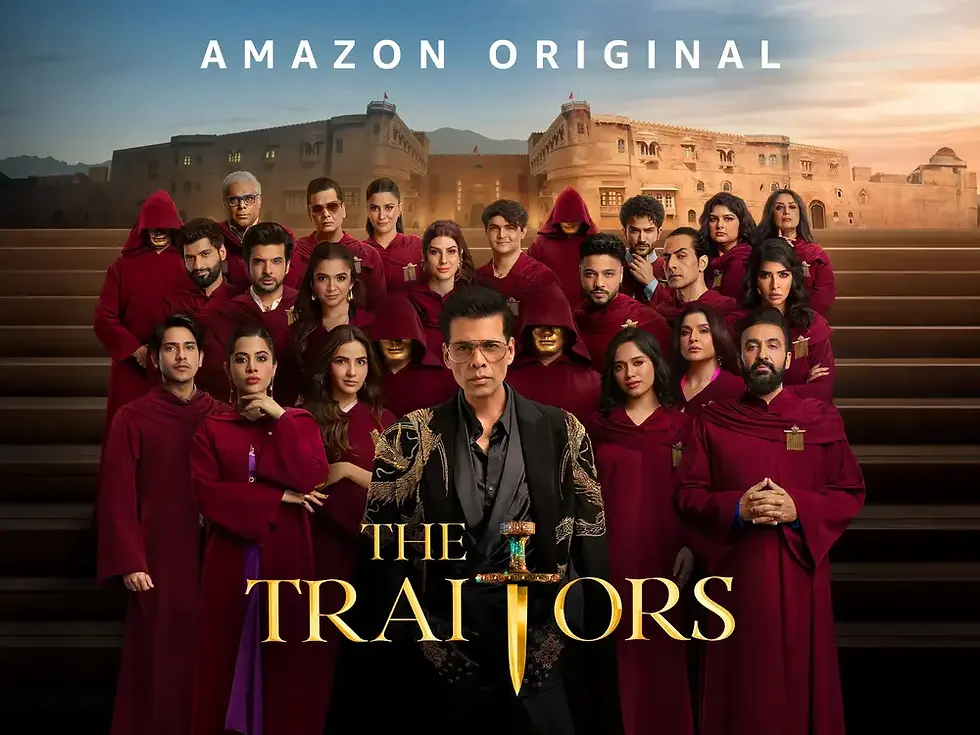Traitors & the Indian Obsession With Drama
- radhika-sinha

- Jul 5
- 3 min read
"Trust is rare, dhokha everywhere" — a line that pops up like a meme, but lately, it’s been echoing in my head. Blame it on the show Traitors India, a reality series that promised to deliver something different: strategy, suspense, social gameplay — all wrapped in just ten episodes. As someone who rarely invests in reality shows (too much drama, too little payoff), I took the plunge, expecting low commitment, maybe even a new guilty pleasure. Instead, what I found was a window into something far more fascinating than the show itself: us. The Indian audience. Our psychology. Our obsession with watching people unravel.

For four Thursdays straight, I binge-watched every new episode, only to find myself more engaged with Reddit discussions, Instagram edits, and wild fan theories than the show’s actual climax. And this led me to wonder: why are we so drawn to watching people lie, cheat, cry, and expose their vulnerabilities? Let’s unpack what Traitors reveals about Indian reality TV and us, the loyal, drama-hungry viewers who make it thrive.
Voyeurism, But Make It Cultural
Indians are often painted as conservative, emotionally restrained, or even traditional. But switch on a reality TV show, and you’ll find something deeply contradictory. We love peeking into people’s lives. We’re not just watching their journey — we’re judging, dissecting, reacting in real time. We don’t just want entertainment; we want access.
There is an unspoken voyeurism that’s culturally baked into us. From neighborhood aunties eavesdropping over balconies to extended families having opinions on someone’s divorce, our curiosity often outweighs our discretion. Reality TV simply scaled this behaviour digitally. The show Traitors may have been about gameplay, but what kept people hooked were the tears, betrayals, and accidental truths. We don’t watch the game. We watch for the gasp-worthy slips.
Privacy Invasion: Is Anything Off-Limits Anymore?
Indian reality shows have made it their USP to strip away any concept of boundaries. From Bigg Boss where fights, therapy-level confessions, and breakdowns are aired with theme music, to Indian Matchmaking, where deeply personal decisions are scrutinized for public entertainment, we’ve normalised watching people live out their worst (and best) moments for views.

What makes it unsettling is how the line between performance and reality continues to blur. Contestants enter the show knowing full well they’re signing up for scrutiny. But what about the emotional aftershocks? The exposure isn’t just about what you do — it’s about how the internet immortalizes it. Traitors, in its climax, showed how audiences turned players into either heroes or villains overnight. In a world where content never dies, is any moment truly private anymore?
We Start Mirroring What We Consume
Here’s something not talked about enough — reality shows don’t just entertain, they influence. As viewers, we often think we’re detached observers, but human psychology doesn’t work that way. What we consume seeps into our speech, behaviours, and even our moral compass. Over time, we start mimicking phrases, conflict styles, even emotional responses we’ve seen on-screen.

Think about how sarcasm, passive aggression, and confrontation have crept into everyday communication, especially online. We might not be in a reality show, but we’ve learnt the performative cues — when to play the victim, how to gain sympathy, or even stir drama. In trying to be real, we’ve begun performing reality.
For Brands & Broadcasters: Chaos Pays
Let’s be honest — no one is doing this for the art. Reality TV is a well-oiled money machine. For broadcasters and streaming platforms, it’s gold. These shows are cheaper to produce than scripted content, and they guarantee high engagement.
Emotional drama = longer watch time + more social buzz.
Every fight, alliance, betrayal is repackaged as micro-content for YouTube, Instagram Reels, and Twitter threads. Sponsors flock to popular contestants. Brands tie up for in-show integrations. Viewers don’t just consume — they participate. They become fans, create memes, buy merchandise, and drive digital chatter. From a marketer’s lens, shows like Traitors aren’t just entertainment. They’re immersive ecosystems — ripe for storytelling, engagement, and conversions. The drama might be scripted, but the numbers aren’t.
What Traitors Taught Me About Us
Traitors may have ended, but what it exposed runs far deeper than strategy or suspense. It showed us who we are when no one’s looking — or maybe, exactly when everyone is. We are a nation of observers, emotionally complex, paradoxically conservative and intrusive, seeking relief in someone else's chaos.
This isn’t a takedown of reality TV. But as marketers, storytellers, or just citizens, we need to ask better questions about what we’re consuming and why.



Comments